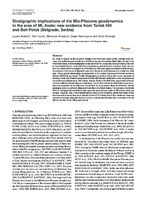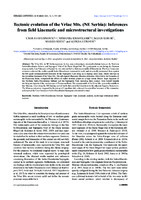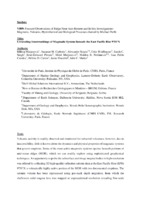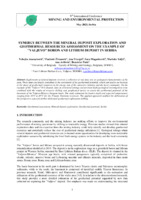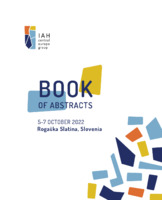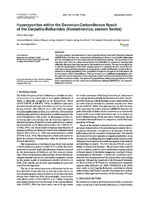Претрага
94 items
-
Late and post-collisional tectonic evolution of the Adria-Europe suture in the Vardar Zone
The Vardar Zone is a product of the Triassic-Jurassic opening of the Neotethys, Jurassic obduction, Late Cretaceous/Paleogene consumption of the oceanic crust and continental collision. During the last process, the Eastern Vardar Zone was thrust over the Central and eventually both onto the Western Vardar Zone. The present paleomagnetic and structural study provided new results from the first two zones in the Belgrade area. The younger set of data, together with published ones from the third zone, provide firm ...Emő Márton, Marinko Toljić, Vesna Cvetkov. "Late and post-collisional tectonic evolution of the Adria-Europe suture in the Vardar Zone" in Journal of Geodynamics, Elsevier BV (2022). https://doi.org/10.1016/j.jog.2021.101880
-
Stratigraphic implications of the Mio-Pliocene geodynamics in the area of Mt. Avala: new evidence from Torlak Hill and Beli Potok (Belgrade, Serbia)
Mt. Avala is located on the southern margin of the Pannonian basin (SPB), a border zone between the uplifted morphostructures of the Dinarides and Carpathian-Balkanides. Similar to the Pannonian basin, tectonostratigraphic evolution of the Mt. Avala area during the last 23 Ma has is characterized by syn- and post-rifting processes as well as tectonic inversion. Here, we present the results of field investigations of the Miocene‒Pliocene dynamics that led to different spatial positions of the same stratigraphic units (e.g. ...... (TOLJIĆ, 2016). During the later tectonic events these faults were reactivated (MAROVIĆ et al., 2007; see Fig. 18). The younger, second fault system (F2) is related to the formation and later evolution of the Pannonian ba- sin. The (F2) faults system orientation reflects a general ENE- WSW direction ...
... developed (Figs. 20 and 21). Besides this orientation, faults which were reactivated in the late Miocene or neotectonic stage (see Fig. 18), exhibit a direction Figure 17. a) Map of the orientation of linear structures in the broader study area. Main faults and neotectonic units separated according to MAROVIĆ ...
... This structure with a measured dip direction and dip angle of the fault (214/48) is part of the reverse faults which were reactivated in the NE-SW ori- ented compressional stress-field. Faults of this direction are sta- tistically recognized as linear structures that belong the first fault system ...Ljupko Rundić, Meri Ganić, Slobodan Knežević, Dejan Radivojević, Miloš Radonjić. "Stratigraphic implications of the Mio-Pliocene geodynamics in the area of Mt. Avala: new evidence from Torlak Hill and Beli Potok (Belgrade, Serbia)" in Geologia Croatica (2019). https://doi.org/10.4154/gc.2019.11
-
Application of machine learning for diagnosing the operation of a deep well pump in oil production
Maja Trikić (2024)This paper will thoroughly examine how machine learning can improve the diagnosis of deep well pumps by analyzing the role and function of the pumps, dynamograms, sensor technologies, and diagnostic methods.Our analysis will provide insights into modern techniques and approaches for enhancing the performance and reliability of oil production systems, targeting cost reduction and increased operational efficiency.deep well pump, dynamograms, machine learning, diagnostics of operating coditions,Random Forest, XGBoost... position (in} Figure 6.2. Examples of sensor faults on surface and downhole dynamometric cards: (a) linear card; (b) noisy card; (c, d) rotated card Although most commercial rod pump system controllers are equipped with alarms for sensor faults, some faults may go unnoticed by the controllers, particularly ...
... using machine learning, we can improve diagnostics and maintenance by recognizing faults before they lead to more serious issues.Finally, we will consider the diagnosis of operational conditions and sensor faults using machine learning in deep well pumping. This segment explores how machine learning ...
... different variables and can be useful for identifying important features indicating faults. d.Neural Networks- Deep models capable of learning complex patterns in large datasets, useful for recognizing specific types of faults. 22 • ForRegression a.Linear Regression - Can be used to predict numerical ...Maja Trikić. Application of machine learning for diagnosing the operation of a deep well pump in oil production, 2024
-
How active is recent tectonics in the central Balkans: Evidence from the Serbian Carpatho-Balkanides
Ana Mladenović (2022)Since the Late Cretaceous, after closure of the Neotethys ocean, tectonic processes in the central Balkan Peninsula were mainly controlled by the mutual interaction of the Adriatic and the Eurasian plates, and tectonic units in-between. Most of the tectonic structures that have been active during Cenozoic times were inherited from previous tectonic stages under different tectonic regimes. Tectonic activity within the Carpatho-Balkan orogen in eastern Serbia since Miocene is conditioned by the existence of the rigid Moesian promontory east ...Ana Mladenović. "How active is recent tectonics in the central Balkans: Evidence from the Serbian Carpatho-Balkanides" in 15th Emile Argand Conference on Alpine Geological Studies, 12-14 September 2022, Ljubljana, Slovenia, University of Ljubljana, Faculty of Natural Sciences and Engineering (2022)
-
Structural and geochronological constraints from the Drina-Ivanjica thrust sheet (Western Serbia): implications for the Cretaceous–Paleogene tectonics of the Internal Dinarides
Kristof Porkoláb, Szilvia Kövér, Zsolt Benkó, Gabor Héja, Melinda Fialowski, Balázs Soós, Nataša Gerzina Spajić, Nevenka Đerić, László Fodor (2019)Internal Dinarides, Drina-Ivanjica thrust sheet, Deformation history, K–Ar dating, Obduction, Structural analysis... map-scale D„ thrust faults and abundant F folds. 5. Late Paleogene to earliest Miocene tectonics of the region was characterized by map-scale strike-slip faults (Dx3), which accommodated N-S shortening and per- pendicular extension. These faults are cut by Miocene normal faults (Da) that accommodated ...
... et al. Dxy structures are dominantly strike-slip faults, which cut D» thrusts (Fig. 2a). These are mostly NNW-SSE striking dextral and subordinately NE-SW striking sinistral faults. A large population of measured mesoscale strike-slip faults show a pattern similar to the map-scale structures ...
... reverse faults” ~ a OO Verse faults 1000Em — — — – supposed D2 thrust — @ • outcrop location 900 E and label of outcrop 800 — 700 — | ~ 600] ~ – — – – – – –v — __ Fig. 4 Mesoscale Do deformation structures. For outcrop locations see Fig. 2a. a Southwest-verging Dy reverse faults and ...Kristof Porkoláb, Szilvia Kövér, Zsolt Benkó, Gabor Héja, Melinda Fialowski, Balázs Soós, Nataša Gerzina Spajić, Nevenka Đerić, László Fodor. "Structural and geochronological constraints from the Drina-Ivanjica thrust sheet (Western Serbia): implications for the Cretaceous–Paleogene tectonics of the Internal Dinarides" in Swiss Journal of Geosciences (2019)
-
Tectonic evolution of the Vršac Mts. (NE Serbia): Inferences from field kinematic and microstructural investigations
The Vršac Mts. in NE Serbia represent the key area to investigate structural relations between the Northern Serbo-Macedonian Subunit and Supragetic Unit of the Dacia Mega-Unit. The geodynamic events during the Variscan orogeny in the Late Paleozoic colligated the two units and led to their metamorphic differentiation. The Late Cretaceous extension exhumed the medium-grade Serbo-Macedonian metamorphic rocks and structurally juxtaposed them against the low-grade metamorphosed basement of the Supragetic Unit along an E-dipping shear zone, which outcrops in the ...severna srpsko-makedonska subjedinica, supragetikum, kinematska analiza, multifazna ekstenzionalna deformacija... dominant ductile deformation of both tec- tonic units, locally foliation has been reactivated or truncated by brittle deformation. One set of brittle structures are high- angle to sub-vertical ~N–S oriented dextral faults (C-dex in Figs. 3, 4d), observed in the vicinity of the Serbo-Mace donian/ Supragetic ...
... of dextral strike-slip faults. SMM-F = Serbo-Macedonian Massif foliation; SMM-L = Serbo-Macedonian Massif stretching lineation; C-F = Serbo-Macedonian\Supragetic contact foliation; C-L = Serbo-Macedonian\Supragetic contact stretching lineation; C-dex = Dextral brittle faults in Serbo-Macedonian\Supragetic ...
... middle Miocene Cerna and Timok faults of the South and Serbian Carpathians, located to the east and south-east of the study area (Fig. 1b). To the south of the study area, such low-offset strike-slip deformation was documented away from the Cerna and Timok faults, in the internal Serbian Carpathians ...Uroš Stojadinović, Nemanja Krstekanić, Bojan Kostić, Marija Ružić, Aleksa Luković . "Tectonic evolution of the Vršac Mts. (NE Serbia): Inferences from field kinematic and microstructural investigations" in Geologica Carpathica, Central Library of the Slovak Academy of Sciences (2021). https://doi.org/https://doi.org/10.31577/GeolCarp.72.5.3
-
Strain Partitioning Around an Indenter During Oroclinal Bending: Inferences From Field Kinematic Study And Analogue Modeling with Application to the European Carpatho-Balkanides Orogen
Nemanja Krstekanić, Liviu Matenco, Ernst Willingshofer, Marinko Toljić, Uroš Stojadinović. "Strain Partitioning Around an Indenter During Oroclinal Bending: Inferences From Field Kinematic Study And Analogue Modeling with Application to the European Carpatho-Balkanides Orogen" in AGU Fall Meeting 2021, New Orleans, USA, 13.-17.12.2021., AGU (2021)
-
Strain partitioning along a curved strike-slip fault system during indentation: inferences from analogue modelling
Nemanja Krstekanić, Ernst Willingshofer, Taco Broerse, Liviu Matenco, Marinko Toljić, Uroš Stojadinović (2021)Nemanja Krstekanić, Ernst Willingshofer, Taco Broerse, Liviu Matenco, Marinko Toljić, Uroš Stojadinović. "Strain partitioning along a curved strike-slip fault system during indentation: inferences from analogue modelling" in GeoMod 2021, Doorn, the Netherlands, 19.-23.9.2021., Utrecht University (2021)
-
Unraveling Innerworkings of Magmatic System Beneath the East Pacific Rise 9º50’N
Milena Marjanović, Suzanne M. Carbotte, Alexandre Stopin, Felix Waldhauser, Satish C. Singh, René-Édouard Plessix, Miloš Marjanović, Malden R. Nedimović, Juan Pablo Canales, Hélène D. Carton, Javier Escartin, John C. Mutter (2021)... the depression, based on the close correlation between the topography of the magma body and expression of the faults in the seafloor, we infer that the inward facing near-axis faults penetrate deep into the crust at steep angles, ~75º, shaping magma reservoirs and exerting control on the magma ...Milena Marjanović, Suzanne M. Carbotte, Alexandre Stopin, Felix Waldhauser, Satish C. Singh, René-Édouard Plessix, Miloš Marjanović, Malden R. Nedimović, Juan Pablo Canales, Hélène D. Carton, Javier Escartin, John C. Mutter. "Unraveling Innerworkings of Magmatic System Beneath the East Pacific Rise 9º50’N" in AGU Fall Meeting 2021, American Geophysical Union (2021)
-
Alpine tectonic evolution of the Northern Serbo-Macedonian subunit: inferences from kinematic and petrological investigations
... adjacent to the Dinarides and Carpathians. The recenttectonic uplift of the Vršac Mts occurred in the Middle to Late Miocene along the WSW-dippingnormal faults that control deposition in the adjacent Zagajica depression. The ENE-WSW oriented extension, which was triggered by the retreat of Carpathian slab ...
... domes that emerge from the surrounding Neogene sediments in the western-central partof the Morava Valley Corridor, was induced by corrugated detachment faults during theOligocene–Miocene E-W oriented Dinaridic extension. Powered by TCPDF (www.tcpdf.org) http://www.tcpdf.org ...Bojan Kostić, Uroš Stojadinović, Nemanja Krstekanić, Marija Ružić, Aleksa Luković. "Alpine tectonic evolution of the Northern Serbo-Macedonian subunit: inferences from kinematic and petrological investigations" in EGU General Assembly 2021, Vienna, Austria, 19.-30.4.2021., EGU (2021). https://doi.org/10.5194/egusphere-egu21-202
-
Tektonska evolucija severoistočnih Dinarida
... ly, brittle structures formed in an E-W compressional regime. These include NNW-SSE oriented reverse and NW-SE to ENE-WSW oriented strike-slip faults. The youngest phase activated both ductile and brittle extensional structures. This phase is associated with the intrusion of the Bukulja and Brajkovac ...
... to the ductile structures, the late-phase brittle deformation is associated with the reactivation and formation of normal and dextral strike-slip faults with variable orientation and NE-dipping tension gashes. This paper has been financed by the „Contract on realisation and financing of scientific ...Nikola Ranđelović, Branislav Trivić, Nemanja Krstekanić, Bojan Kostić, Uroš Stojadinović. "Tektonska evolucija severoistočnih Dinarida" in 18. Kongres geologa Srbije "Geologija rešava probleme", Divčibare, 01-04 jun 2022., Srpsko geološko društvo (2022)
-
Determination of the groundwater-leakage mechanism (binary mixing) in a karstic dam site using thermometry and isotope approach (HPP Visegrad, Bosnia, and Herzegovina)
Earth-Surface Processes,Geology, Pollution, Soil Science, Water Science and Technology, Environmental Chemistry, Global and Planetary ChangeLjiljana Vasić, Saša Milanović, Anita Puskás-Preszner, Laszlo Palcsu. "Determination of the groundwater-leakage mechanism (binary mixing) in a karstic dam site using thermometry and isotope approach (HPP Visegrad, Bosnia, and Herzegovina)" in Environmental Earth Sciences, Springer Science and Business Media LLC (2020). https://doi.org/10.1007/s12665-020-08910-x
-
Synergy between the mineral deposit exploration and geothermal resources assessment on the example of "Valjevo" boron and lithium deposit in Serbia
Nebojša Atanacković, Vladimir Živanović, Ana Vranješ, Sava Magazinović, Marinko Toljić, Ana Arifović, Branislav Potić (2023)Exploration of mineral deposits involves a collection of vast data sets on geological characteristics of the area. These data can largely contribute to the assessment of the geothermal potential, which can lead to an increase in the share of geothermal resources in the energy mix of the extractive industry and the local community. On the example of the "Valjevo" B-Li deposit, data on structural settings and previous hydrogeological investigations were combined with the results of resource drilling and geophysical ...... E-W direction with a maximal thickness around 900 m in central parts. The tectonic framework comprises older NE-SW and NW-SE faults, later overprinted with major E-W normal faults. Although the tectonic setting: of the basin is complex, the ore body zone is situated in a relatively undisturbed area with ...
... part of the "Valjevo-Mionica" basin — Legend: Yellow — Neogene sediments; Puprule shades — Triassic rocks; Brown to gray — Paleozoic; Red lines – faults; Arrows — estimated groundwater flow direction The geothermal reservoir was formed in rocks of the Mesozoic age, predominantly in Triassic sediments ...
... assessing geothermal characteristics. Elevated geothermal gradients (average about 6 "C/100 m), structural assembly, especially Kolubara and Banjska faults, as well as existing occurrences of thermal waters are identified as the most significant indicators of the geothermal potential. Magmatism has been ...Nebojša Atanacković, Vladimir Živanović, Ana Vranješ, Sava Magazinović, Marinko Toljić, Ana Arifović, Branislav Potić. "Synergy between the mineral deposit exploration and geothermal resources assessment on the example of "Valjevo" boron and lithium deposit in Serbia" in Proceedings 9th International Conference mining and environmental protection, MEP23, Sokobanja, 24-27th May 2023, Beograd : Univerzitet u Beogradu, Rudarsko-geološki fakultet (2023)
-
Exhumation history of the Juhor Mts. in central Serbia, the Northern Serbo–Macedonian Subunit
Uros Stojadinovic, Hannah Pomella, Nemanja Krstekanić, Bojan Kostić, Maja Maleš, Nikola Randjelovic, Miloš Radonjić (2024)Northern Serbo–Macedonian Subunit, low-t thermochronology, kinematic analyses, extensional deformationsUros Stojadinovic, Hannah Pomella, Nemanja Krstekanić, Bojan Kostić, Maja Maleš, Nikola Randjelovic, Miloš Radonjić. "Exhumation history of the Juhor Mts. in central Serbia, the Northern Serbo–Macedonian Subunit" in Geologica Carpathica, Jun 2024, Central Library of the Slovak Academy of Sciences (2024). https://doi.org/10.31577/GeolCarp.2024.12
-
Pećina Peštera kod Laznice - primer razvića speleoloških objekata u zoni raseda (rasednoj breči)
Mihajlo Mandić, Ana Mladenović (2022)Pećina Peštera se nalazi istočno od sela Laznica kod Žagubice. Iako lako pristupačna za posetioce i istraživače, do sada nije bila predmet detaljnijih istraživanja. Pominje se samo u prikazu arheološki interesantnih objekata okoline Žagubice, ali sa svedenim i uglavnom netačnim podacima o morfološkim karakteristikama. Speleološki značaj joj daje, pored relativno velikih dimenzija dvorane, njen razvoj u tektonski veoma oštećenoj zoni ukrštanja dva raseda što za posledicu ima potpunu dezintegraciju stenske mase u breču. Proces karstifikacije breče formira specifične morfološke ...Mihajlo Mandić, Ana Mladenović. "Pećina Peštera kod Laznice - primer razvića speleoloških objekata u zoni raseda (rasednoj breči)" in Zbornik 9. Simpozijuma o zaštiti karsta, Beograd : Akademski speleološko-alpinistički klub (2022)
-
Hypogene speleogenesis related to porphyry magmatic intrusions and its influence on subsequent karst evolution in the Peruvian high Andes
Alexander Klimchouk, David Evans, Sasa Milanovic, Cristian Bittencourt, Mauro Sanchez, F. Carlos Aguirre (2022)Alexander Klimchouk, David Evans, Sasa Milanovic, Cristian Bittencourt, Mauro Sanchez, F. Carlos Aguirre. "Hypogene speleogenesis related to porphyry magmatic intrusions and its influence on subsequent karst evolution in the Peruvian high Andes" in Geomorphology, Elsevier BV (2022). https://doi.org/10.1016/j.geomorph.2022.108488
-
Classifying large strains from digital imagery: application to analogue models of lithosphere deformation
... evolution of 2D plane deformation of analoguemodels of tectonic processes. Under relevant forcings, these models develop internaldeformation, such as faults, and broader zones of deformation. We use Particle Image Velocimetry(PIV) to derive incremental displacements from top-view images that we use in ...Taco Broerse, Nemanja Krstekanić, Cor Kasbergen, Ernst Willingshofer. "Classifying large strains from digital imagery: application to analogue models of lithosphere deformation" in EGU General Assembly 2021, Vienna, Austria, 19.-30.4.2021., EGU (2021)
-
Hydrochemical indicators of groundwater flow in the area of “Čukaru Peki” Cu-Au underground mine in eastern Serbia
The physical and chemical properties of groundwater, together with the groundwater levels regime and rock hydraulic properties, are often used to understand and conceptualize the hydrogeological system. Prediction of the influence of mining works on groundwater, and vice versa, is a challenge due to significantly altered groundwater flow patterns in the raw materials exploitation areas in relation to natural conditions. Therefore, multiple parameters are assessed and monitored before and during exploitation to properly characterize and quantify the system for ...Nebojša Atanacković, Vladimir Živanović, Jana Štrbački, Veselin Dragišić, Ivana Cvejić. "Hydrochemical indicators of groundwater flow in the area of “Čukaru Peki” Cu-Au underground mine in eastern Serbia" in 5th IAH CEG conference, Slovenian Committee of International Association of Hydrogeologists - SKIAH (2022)
-
Hyperpycnites within the Devonian-Carboniferous flysch of the Carpatho-Balkanides (Kostadinovica, eastern Serbia)
Miloš Radonjić (2020)This study presents new discoveries of vascular plants and the trace fossil Dictyodora liebeana (GEINITZ) from the Devonian–Carboniferous Kučaj-Zvonce flysch of the Carpatho-Balkanides and the implications of this fossil association for its sedimentary setting. The occurrence of the described plant debris in a deep-marine environment indicates the presence of hyperpycnites within the siliciclastic turbidites exposed at the Kostadinovica locality. The sedimentological data and the characteristics of the fossil material support the proposed model in which the sediment was at ...Mississippian flora, Dictyodora liebeana (GEINITZ), hyperpycnites, Kučaj-Zvonce flysch, Carpatho-Balkanides... d rocks, etc.). Furthermore, the middle part of the succession is truncated by a system of brittle, dextral strike-slip faults (Fss in Fig. 2). Movement along these faults can be concluded based on the Riedell’s plains and folding related to the faulting process. The amount of displacement along ...
... oriented in a NW – SE direction (~ 310-130°) with a steep dipping angle (~80° to vertical). A second group of ob- served faults has a more localized influence on the succession. These faults (Fn in Fig. 2) have normal movements and are related to the Fss fault zone probably as a part of a transtensional ...
... letters A – D mark the interpreted units while white lines indicate their boundaries. Fault sys- tems (Fss – strike-slip fault zone; Fn – gravitational faults) are marked in red. White arrows point toward the position of figures presented in this paper. Photo taken during August 2019. G eo lo g ia ...Miloš Radonjić. "Hyperpycnites within the Devonian-Carboniferous flysch of the Carpatho-Balkanides (Kostadinovica, eastern Serbia)" in Geologia Croatica, Croatian Geological Survey (2020). https://doi.org/10.4154/gc.2020.13
-
Definisanje strukturnih odnosa primenom postupka horizontalni gradijent
Različiti postupci matematičkih transformacija se mogu primeniti na gravimetrijskim i magne tometrijskim podacima, kako bi se na istražnom terenu definisali strukturno-tektonski odnosi. U radu su prikazani rezultati dobijeni korišćenjem postupka horizontalni gradijent i ukupni horizontalni gradijent na gravimetrisjkim podacima. Navedeni postupci su pomogli da se detektuju kontakti sa velikim padnim uglom (vertikalni ili subvertikalni kontakti), koji se mogu interpretirati kao rasedi. Za test područije uzet je istražni prostor koji se nalazi na jugoistoku Srbije u okolini Vranjskog basena. Položaji ...... large dip angle (vertical or subvertical contacts), which can be interpreted as faults. For the test area we take the study area located in southeast Serbia around Vranje basin. The positions of neotectonics faults detected during geological survey in the area of the Vranje basin partially coincides ...Snežana Ignjatović, Ivana Vasiljević, Natalija Jovanović. "Definisanje strukturnih odnosa primenom postupka horizontalni gradijent" in Tehnika, Beograd : Savez inženjera i tehničara Srbije (2019). https://doi.org/10.5937/tehnika1905664I

